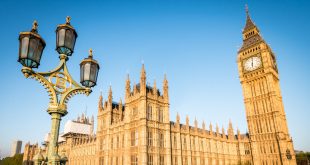As the late Madam Cyn might have attested, some MPs seem to gain odd pleasure from the sensation of pain. Indeed, the lexicon of British politics is littered with masochistic references – where else might it be acceptable to be ‘whipped’ on a regular basis, for Parliament to be ‘hung’ or to risk an encounter with the ‘Black Rod’?
So it seems to be with the current Government. Having taken an eternity to make a decision over maximum stakes on FOBTs, ministers appear intent on dragging out the controversy for another couple of years – according to a report this week in The Times, which claimed that HM Treasury had insisted on a lengthy stay of execution.
Rumours have been circulating for some weeks that the transition to a £2 stake maximum would be a protracted one but such claims appeared at odds with official guidance from the DCMS. Only last week, the gambling minister, Tracey Crouch (Cons, Chatham & Aylesford) stated that operators would be given “sufficient time to implement and complete the technological changes”. Even if one adds in the pressures of the parliamentary calendar and the time required for rubber-stamping in Brussels, two years seems to be a remarkably glacial rate of progress for simply implementing “technological changes”.
There is logic in giving the sector an extended period of grace to prepare for what is likely to be a profound change in its economic model – but this becomes harder to support when the product being considered has been termed a “social blight” by the Culture Secretary, Matt Hancock (while Foreign Secretary Boris Johnson once called the machines “the scourge of our high streets”). Hoisted by the petard of its own colourful rhetoric, the Government is likely to be forced back into the mode of evasive action that characterised so much of its conduct during the review.
The Times also reported that HM Treasury was unwilling to wait for the £2 stake to take effect before hiking the rate of remote gaming duty – although the increase may be lower than the 20% widely assumed (a rare silver lining to the grey clouds that have gathered over the remote sector).
Perhaps the darkest of those clouds (at least for some operators) is the threat of greater advertising restrictions and the possible banning of pre-watershed gambling ads on TV. After its first full week, the Early Day Motion tabled by Anne Main (Cons, St Albans) now has 22 MP signatures, including a number of veterans from the anti-FOBT campaign. Interestingly, the matter of gambling advertising appears to have generated greater cross-party concerns. Five Conservative MPs have now signed EDM 1351 alongside seven Labour MPs, five from the SNP, three DUP, one independent and one from Plaid Cymru.

Indeed, the four ‘live’ EDMs on gambling currently before Parliament – dealing with advertising, advertising free bets, the use of credit cards online and the presence of ATMs in casinos – have all been tabled by Conservative MPs. By contrast, there were only two Tory signatories to EDM 174 which called for stake reduction on FOBTs.
The Democratic Unionist MP, David Simpson (DUP, Upper Bann) was one of the 15 MPs to sign EDM 1351 this week. In a further sign of the scrutiny that remote gambling is now under, he also submitted a Parliamentary Question asking whether the DCMS would “introduce legislative proposals on limiting the time for which a user can be active on an online gambling site or app”.
Elsewhere, PQs tended to focus on deregulation for society lotteries (another interminable gambling review) and the broader matter of gambling-related harm. Sir Mark Hendrick (Lab, Preston) quizzed Government on the provision of treatment services for gambling addiction and the need for secondary school education on the risks of gambling. Going off previous form, the answer from the Department of Health is likely to be underwhelming; but at least the Health Secretary Jeremy Hunt will be able to cite his visit this week to Dr Henrietta Bowden-Jones’s National Problem Gambling Clinic in London (curiously just a few weeks after a visit from the Labour Party Deputy Leader, Tom Watson and the Shadow Health Secretary Jonathan Ashworth).
As we have observed before, the focus of public policy debate is shifting from problem gambling and problem gamblers to gambling harm and problem products and next week’s Excessive Gambling Wales conference (featuring the bete noire of the Australian betting sector, Professor Samantha Thomas as keynote speaker) is likely to turn up the heat.
In Parliament next week, Tracey Crouch may find herself ruing the breakdown in diplomatic relations with Russia that have prevented her (as Sports Minister) from travelling to the World Cup. Instead of enjoying the classic encounter of England with Tunisia (which requires masochism of a different stripe), Crouch can look forward to further awkward questioning on gambling as part of Thursday’s DCMS oral PQs.
It is also possible that gambling matters may get raised in Prime Minister’s Questions, where Fiona Bruce (Cons, Congleton) and Ronnie Cowan (SNP, Inverclyde) have secured adjacent berths. All of which may make for another sweetly agonising week in politics for gambling.
Switzerland: remote legislation – Swiss loss?
Switzerland’s referendum last weekend easily confirmed the government’s policy of limiting online gaming to landbased casinos (without the ability to structure affiliate partners or ‘skins’). Provision of online services will be supported by website blocking and potentially criminal sanction.
There are three key points to make here. First, Switzerland will have modern and clearly applicable restrictive law, meaning ‘grey’ becomes ‘black’. While a relatively small country (pop. 8.3m), it is a material market for many German-speaking sites especially, which we estimate to be worth c. €120m (gaming only). This will be a noticeable impact, especially when combined with risks and issues in the other two ‘DACH’ countries.
Second, Switzerland has 21 commercial casinos and each can offer a remote presence. While there are obviously limitations to operational expertise, these can be overcome through B2B relationships and can provide a critical mass of competition if well executed (unlikely in the near term, but with medium-term prospects, in our view). Therefore, while it might be bad news for .com operators, a functioning consumer market might nevertheless evolve – and one which is far more efficient (from Switzerland’s point of view) in terms of taxes and jobs.
Finally, it is tempting to focus on the low turn-out (34%) and point to a relatively small number of protectionist votes even with an overwhelming majority (72%). However, this reinforces a key problem for gambling: lots of consumers like it a bit, but won’t put much effort into shaping it, whereas the cohort of distaste will mobilise. A lobby which showed the Swiss consumer what benefits they would get from a more liberal approach could have worked, but this was not effectively articulated – broad appeals to freedom of choice (inevitably tainted by offshore interests in the eyes of some) was never going to cut it, here or elsewhere.
US: sports betting regulation – laws of the land…
Mississippi is likely to join the growing early-mover ranks of sports betting states sooner than expected, with 2017 legislation to allow pool bets in state casinos being argued to immediately permit betting in r the Choctaw’s reservation casinos under the Class III terms of the 1994 Compact (MS has 28 state casinos, including 16 riverboats; 3 tribal). However, there are no plans to allow online betting and this makes one thorny issue go away – whether online product provided from Indian Reservations can be made available within the state. Given that most (but not all) tribal lands exist through federal decree as “domestic dependent nations” and there is clear demarcation of sovereignty, a case that the Wire Act applies could be made since there is a border.
Here the tribes have the stick of lucrative compacts to threaten online progress, but the carrot of reciprocal online rights may be a complicated (even impossible) one to allow (although gaming is possible given the DOJ’s 2011 ‘clarification’ of the Wire Act, if a very big prize to give). This potential impasse is likely to colour pending legislation wherever tribes have material gaming interests, in our view – and that is a lot of states (critically, including California).
Global: tennis match-fixing – sixth arrest in Belgium
A sixth Armenian national has been charged in Belgium with various criminal offences – including corruption and illegal gambling – as part of an international investigation into match-fixing in tennis. It has been reported that an Armenian-Belgian criminal network is suspected of having bribed tennis players to fix matches over the past four years.
It is interesting (and unsurprising) that the investigation appears to have begun with the identification of suspicious betting patterns – highlighting the important role which operators have to play in the identification and investigation of match-fixing. Of particular note, however, is the reported involvement of law enforcement agencies in various territories across Europe and the United States.
The threat in this case (and increasingly in match-fixing more generally) is international, criminal and highly organised. Sports bodies have an important front-line role to play, but they are not equipped to deal adequately with this kind of threat alone. Collaboration between all partners including (crucially) law enforcement is an absolute necessity if the threat of match-fixing is to be addressed effectively.
UK: safer gambling and banking – Starling Role for Safer Gambling
The announcement this week that Starling Bank would allow customers to block of restrict gambling transactions signals the long overdue arrival of financial services in the field of safer gambling.
Starling followed fellow challenger back, Monzo in announcing this feature which uses online merchant codes to identify and restrict transactions – something that has long been available for corporate cards but not personal ones. It is rumoured that Royal Bank of Scotland may be next to announce such an option.
Given the reported teething problems faced by GAMSTOP, the development of account restrictions (based on customer choice) ought to be a good thing for gamblers and operators alike. It may also lead to broader collaboration covering affordability checks and measures for landbased venues (such as ATM or OTC controls).
It also demonstrates that operator efforts on safer gambling ought not to be restricted to what companies do – but also how they can influence the broader supply chain to support efforts.









